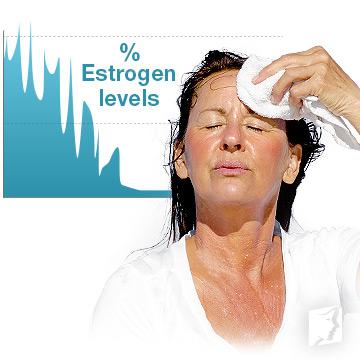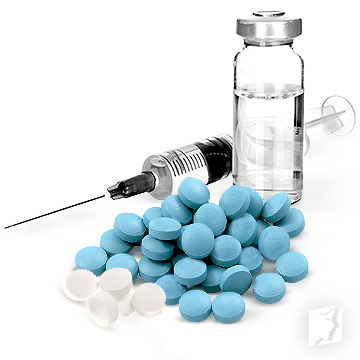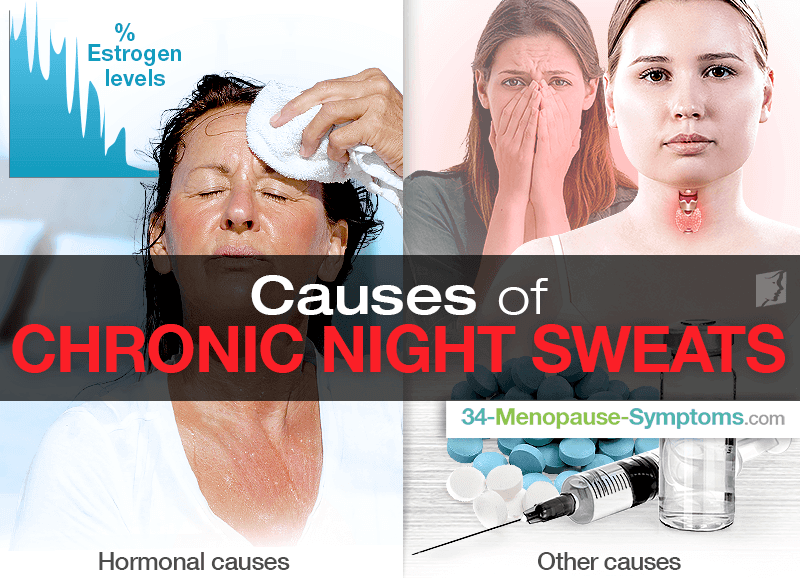Night sweats are the nocturnal equivalent of hot flashes. It's common for women who experience them to wake up in the middle of the night, drenched in sweat and chilled to the bones. As one of the more common symptoms of menopause, their occurrence can pass on for years if left untreated.
Keep reading to learn important things to know about chronic night sweats, including their causes and when you should consider seeing a doctor.
Recognizing Chronic Night Sweats
It is common for women of all ages to occasionally wake up in the middle of the night from excessive perspiration. This generally does not require need for concern. It could be from keeping their bedroom too warm or using too many blankets.
However, chronic night sweats occur on a daily basis and are long-term. They can even happen when external factors are under control. They are due to an underlying medical condition or illness and will last long-term until treated.
Causes of Chronic Night Sweats
Hormonal causes

Women who are going through the menopausal transition are most likely to suffer from night sweats due to hormonal fluctuations taking place in their bodies as reproductive functions are coming to a halt. For those women who suffer from severe and drastic hormonal imbalance, chronic night sweats might be a consequence.
Throughout a woman's reproductive life, estrogen has been a principal hormone involved in the process of body temperature regulation. This sex hormone regularly communicates with the hypothalamus, the part of the brain responsible for body temperature. When estrogen fluctuates, the hypothalamus registers that the body is overheating and starts sweating to compensate, leading to night sweats.
Keep in mind that until the underlying cause of hormonal imbalance is treated, these frequent bouts of nocturnal sweating will last for years.
Other causes

Chronic night sweats are also a side effect of certain medications. These medications include hormone-blocking drugs, diabetic medications, pain killers, steroids, and antidepressants.
Once off of these drugs, night sweats and other side effects provoked by the medications should subside.
In addition, there are a myriad of medical conditions that can cause frequent night sweats in women. These include, but are not limited to, anxiety, thyroid, sleep, and autoimmune disorders; HIV/AIDS; cancer; tuberculosis; bacterial infections such as brucellosis; hypoglycemia; and many more.
Just like with hormonal imbalance, night sweats from medical conditions are constant and will last long-term until the health issue is resolved.
When to See a Doctor
If you are suffering from long-term chronic night sweats that are disturbing your sleep regularly, you should seek help. You should also go to see a doctor if your frequent night sweats are accompanied by symptoms of fever, weight loss, coughing, gastrointestinal problems, localized pain, or other concerning symptoms.
If your chronic night sweats are occurring alongside other menopausal symptoms, the best way to get rid of them would be to treat the underlying cause of hormonal imbalance.
Night sweats treatments to promote hormonal balance naturally include lifestyle changes and alternative medicine. Optimize your diet with foods rich in phytoestrogens to fill the hormonal gap, balance vitamin E and B levels, and practice healthy sleep habits by wearing breathable fabrics, avoiding constrictive clothing, and evading spicy or hot foods right before bedtime.
Whereas, alternative medicine options include phytoestrogenic herbal supplements - which provide the body with more concentrated phytoestrogens than food substances and include black cohosh and red clover - as well as hormone-regulating supplements, like Macafem. The latter works with your body to encourage its own hormone production, thus relieving any symptoms of hormonal imbalance, including chronic night sweats.
Key Takeaways
All in all, long-term chronic night sweats are one of the many menopause symptoms that can disrupt a woman's life if left untreated. In perimenopausal women, they most often occur due to drastic hormonal fluctuations taking place in their bodies. Nevertheless, they can also be caused by certain medications and other medical conditions and illnesses.
If severe night sweats are disturbing your sleep regularly or are accompanied by other menopause symptoms, it would be wise to seek help. Natural treatment options include lifestyle changes, which work better when combined with alternative medicines, such as phytoestrogenic herbal supplements and hormone-regulating supplements.
Sources
- Freedman, R.R. (2014). Menopausal Hot Flashes: Mechanisms, Endocrinology, Treatment. The Journal of Steroid Biochemistry and Molecular Biology, 142, 115-120. doi: 10.1016/j.jsbmb.2013.08.010
- Mayo Clinic. (2018). Night sweats: Definition | Night sweats: Causes | Night sweats: When to see a doctor. Retrieved November 9, 2018, from https://www.mayoclinic.org/symptoms/night-sweats/basics/definition/sym-20050768 | https://www.mayoclinic.org/symptoms/night-sweats/basics/causes/sym-20050768 | https://www.mayoclinic.org/symptoms/night-sweats/basics/when-to-see-doctor/sym-20050768
- NHS. (2017). Night sweats. Retrieved November 9, 2018, from https://www.nhs.uk/conditions/night-sweats/




